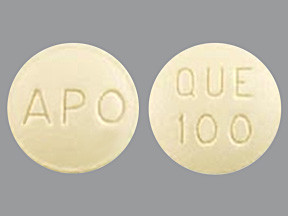QUETIAPINE - ORAL
PHONETIC PRONUNCIATION: (kweh-TIE-ah-peen)
COMMON BRAND NAME(S): Seroquel
GENERIC NAME(S): quetiapine fumarate
Uses
USES: This medication is used to treat certain mental/mood conditions (such as schizophrenia, bipolar disorder, sudden episodes of mania or depression associated with bipolar disorder). Quetiapine is known as an anti-psychotic drug (atypical type). It works by helping to restore the balance of certain natural substances (neurotransmitters) in the brain. This medication can decrease hallucinations and improve your concentration. It helps you to think more clearly and positively about yourself, feel less nervous, and take a more active part in everyday life. It may also improve your mood, sleep, appetite, and energy level. Quetiapine can help prevent severe mood swings or decrease how often mood swings occur.
How to use QUETIAPINE - ORAL
HOW TO USE: Read the Medication Guide and, if available, the Patient Information Leaflet provided by your pharmacist before you start using quetiapine and each time you get a refill. If you have any questions, ask your doctor or pharmacist. Take this medication by mouth as directed by your doctor, usually 2 or 3 times daily with or without food. For the treatment of depression associated with bipolar disorder, take this medication by mouth as directed by your doctor, usually once daily at bedtime. The dosage is based on your medical condition, response to treatment, and other medications you may be taking. Be sure to tell your doctor and pharmacist about all the products you use (including prescription drugs, nonprescription drugs, and herbal products). To reduce your risk of side effects, your doctor may direct you to start this medication at a low dose and gradually increase your dose. Follow your doctor's instructions carefully. Take this medication regularly to get the most benefit from it. To help you remember, take it at the same times each day. Do not increase your dose or use this drug more often or for longer than prescribed. Your condition will not improve any faster, and your risk of side effects will increase. It is important to continue taking this medication as prescribed even if you feel well. Do not stop taking this medication without consulting your doctor. Some conditions may become worse when this drug is suddenly stopped. Also, you may experience symptoms such as trouble sleeping, nausea, headache, diarrhea, irritability. Your dose may need to be gradually decreased to reduce side effects. Report any new or worsening symptoms right away. Tell your doctor if your condition persists or worsens.
Side Effects
Precautions
Interactions
Overdose
Images

- color
- white
- shape
- round
- imprint
- APO, QUE 50

- color
- yellow
- shape
- round
- imprint
- APO, QUE 100

- color
- yellow
- shape
- round
- imprint
- APO, QUE 100

- color
- white
- shape
- round
- imprint
- APO, QUE 200

- color
- white
- shape
- round
- imprint
- APO, QUE 200

- color
- white
- shape
- oblong
- imprint
- APO, QUE 300

- color
- yellow
- shape
- oblong
- imprint
- APO, QUE 400
Reviews
Faq for QUETIAPINE - ORAL
Quetiapine is an oral medication primarily used for treating schizophrenia and bipolar disorder. It is also sometimes prescribed to treat major depressive disorder (MDD) and as an adjunctive treatment for obsessive-compulsive disorder (OCD).
Quetiapine works by blocking the action of certain chemicals in the brain, such as dopamine and serotonin. This helps to restore the balance of these chemicals and reduce symptoms of schizophrenia, bipolar disorder, and depression.
Common side effects of Quetiapine may include drowsiness, dizziness, dry mouth, constipation, blurred vision, weight gain, and increased heart rate. It is important to consult a healthcare professional if you experience any severe or persistent side effects while taking this medication.
The onset of action for Quetiapine can vary from individual to individual. Some people may start experiencing improvements in their symptoms within a few days, while others may take several weeks to notice the full effects of the medication. It is crucial to follow the prescribed dosage and consult a healthcare professional for guidance.
Quetiapine is not considered addictive. However, sudden discontinuation of the medication can lead to withdrawal symptoms such as insomnia, nausea, and irritability. It is advised to gradually reduce the dosage under medical supervision when discontinuing Quetiapine.
Quetiapine may interact with certain medications, such as antidepressants, antifungals, or medications that cause drowsiness. It is important to inform your healthcare provider about all the medications, herbal supplements, and vitamins you are taking to avoid any potential interactions. Alcohol consumption should be avoided while taking Quetiapine due to increased drowsiness and dizziness.
Quetiapine should be used with caution during pregnancy and only if the potential benefits outweigh the risks. It may pass into breast milk, so it is recommended to discuss with a healthcare professional before using Quetiapine while breastfeeding.
Quetiapine should be taken exactly as prescribed by the healthcare provider. It is usually taken once or twice a day with or without food. The dosage is determined based on the condition being treated and individual response. Do not crush, chew, or break the extended-release tablet, as it needs to be swallowed whole.
If you miss a dose, take it as soon as you remember. However, if it is close to the time for your next scheduled dose, skip the missed dose and continue with your regular dosing schedule. Do not take double doses to make up for a missed dose.
Warning
WARNING: There may be a slightly increased risk of serious, possibly fatal side effects (such as stroke, heart failure, fast/irregular heartbeat, pneumonia) when this medication is used by older adults with dementia. This medication is not approved for the treatment of dementia-related behavior problems. Discuss the risks and benefits of this medication, as well as other effective and possibly safer treatments for dementia-related behavior problems, with the doctor. Quetiapine is used to treat certain mental/mood disorders (such as schizophrenia, bipolar disorder, sudden episodes of mania or depression associated with bipolar disorder). Drugs used to treat depression can help prevent suicidal thoughts/attempts and provide other important benefits. However, studies have shown that a small number of people (especially people younger than 25) who take drugs to treat depression may experience worsening depression, other mental/mood symptoms, or suicidal thoughts/attempts. Therefore, it is very important to talk with the doctor about the risks and benefits of drugs used to treat depression (especially for people younger than 25), even if treatment is not for a mental/mood condition. Tell the doctor right away if you notice worsening depression/other psychiatric conditions, unusual behavior changes (including possible suicidal thoughts/attempts), or other mental/mood changes (including new/worsening anxiety, panic attacks, trouble sleeping, irritability, hostile/angry feelings, impulsive actions, severe restlessness, very rapid speech). Be especially watchful for these symptoms when a new drug to treat depression is started or when the dose is changed. This medication is not approved for use in children under 10 years old.
Disclaimer
IMPORTANT: HOW TO USE THIS INFORMATION: This is a summary and does NOT have all possible information about this product. This information does not assure that this product is safe, effective, or appropriate for you. This information is not individual medical advice and does not substitute for the advice of your health care professional. Always ask your health care professional for complete information about this product and your specific health needs.

No Reviews Yet